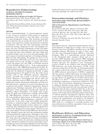 October 2023 in “IJEM case reports”
October 2023 in “IJEM case reports” A 15-year-old girl with no menstrual period was diagnosed with a genetic condition that makes her body unable to respond to male hormones, leading to female characteristics despite having male genetic makeup.
 19 citations,
February 2012 in “International Journal of Urology”
19 citations,
February 2012 in “International Journal of Urology” In Japan, sex reassignment surgery for gender identity disorder faces challenges and needs better medical support and education.
 November 2016 in “Elsevier eBooks”
November 2016 in “Elsevier eBooks” Genetic mutations can affect female sexual development, requiring personalized medical care.
 July 2021 in “Advances in laboratory medicine”
July 2021 in “Advances in laboratory medicine” Diagnosing sex development disorders requires combining medical history, physical exams, imaging, lab tests, and genetic data.
 2 citations,
August 2020 in “JCRPE”
2 citations,
August 2020 in “JCRPE” A girl with Denys-Drash syndrome was misdiagnosed due to biotin affecting her hormone test results.
 39 citations,
April 2018 in “Hormones”
39 citations,
April 2018 in “Hormones” No consistent link between genotype and phenotype in 5-α-Reductase type 2 deficiency.
 4 citations,
December 2012 in “Arquivos Brasileiros De Endocrinologia E Metabologia”
4 citations,
December 2012 in “Arquivos Brasileiros De Endocrinologia E Metabologia” A postmenopausal woman's masculine symptoms improved after surgery for a hormone-producing ovarian tumor.
 January 2014 in “European Geriatric Medicine”
January 2014 in “European Geriatric Medicine” A postmenopausal woman's virilization was caused by a rare ovarian tumor that was hard to detect but was successfully treated with surgery.
 20 citations,
October 2017 in “Clinical Endocrinology”
20 citations,
October 2017 in “Clinical Endocrinology” The conclusion is that removing both ovaries is the best treatment for excess male hormones in postmenopausal women, with medication as another option, and managing insulin resistance is important for diagnosis and treatment.
 4 citations,
December 2018 in “Case reports in endocrinology”
4 citations,
December 2018 in “Case reports in endocrinology” A 63-year-old woman's male-like symptoms were caused by a rare testosterone-producing ovarian tumor, treated by removing her ovaries and fallopian tubes.
514 citations,
February 2011 in “International journal of women's health” Different treatments for PCOS focus on the specific symptoms, with weight loss and lifestyle changes being important.
21 citations,
November 2017 in “Cochrane library” Ovarian drilling surgery is not clearly better than medical treatments for PCOS symptoms.
 November 2022 in “Journal of the Endocrine Society”
November 2022 in “Journal of the Endocrine Society” Taking biotin can lead to incorrect low results in free testosterone tests.
 December 2015 in “Kosin Medical Journal”
December 2015 in “Kosin Medical Journal” PCOS treatment should address both symptoms and metabolic risks, starting with lifestyle changes and possibly including medication.
 131 citations,
August 2004 in “Best Practice & Research in Clinical Obstetrics & Gynaecology”
131 citations,
August 2004 in “Best Practice & Research in Clinical Obstetrics & Gynaecology” The conclusion is that PCOS is caused by ovarian sensitivity to hormones and disrupted hormone control, possibly due to ovarian factors, and more research is needed.
 14 citations,
January 2008 in “Gynecological Endocrinology”
14 citations,
January 2008 in “Gynecological Endocrinology” High levels of male hormones in women without tumors are linked to metabolic problems and can be treated with metformin.
 April 2020 in “Journal of the Endocrine Society”
April 2020 in “Journal of the Endocrine Society” A woman's severe hirsutism was caused by Leydig cell tumors in her ovaries, which improved after surgery.

A thorough diagnostic process and teamwork are crucial for managing complex hyperandrogenism in postmenopausal women.
 12 citations,
March 2018 in “Medicine”
12 citations,
March 2018 in “Medicine” A postmenopausal woman's hirsutism and high testosterone levels improved after surgery for an ovarian tumor not seen on ultrasound.
 May 2023 in “The journal of sexual medicine”
May 2023 in “The journal of sexual medicine” Ovarian Hyperthecosis caused hypersexuality in an older woman and was successfully treated with surgery.
 1 citations,
February 2016 in “European Journal of Obstetrics & Gynecology and Reproductive Biology”
1 citations,
February 2016 in “European Journal of Obstetrics & Gynecology and Reproductive Biology” An 84-year-old woman's hair loss was due to a rare condition called Leydig cell hyperplasia, which was treated with surgery.
 November 2018 in “Endocrine Abstracts”
November 2018 in “Endocrine Abstracts” A woman's high testosterone levels were caused by a rare ovarian tumor, not the initially diagnosed condition.
 August 2019 in “Journal of Dermatology”
August 2019 in “Journal of Dermatology” Woman with diabetes had hair loss due to rare ovarian tumor; surgery improved hair growth.
 2 citations,
May 2018 in “Diagnosis”
2 citations,
May 2018 in “Diagnosis” A 68-year-old woman developed male traits due to a tumor in her ovary, which was removed, returning her hormone levels to normal.
 1 citations,
January 2018 in “Journal of Gynecologic Surgery”
1 citations,
January 2018 in “Journal of Gynecologic Surgery” Removing both ovaries can treat increased testosterone and related symptoms in postmenopausal women with ovarian hyperthecosis.
 3 citations,
April 2020 in “Clinical endocrinology and metabolism journal”
3 citations,
April 2020 in “Clinical endocrinology and metabolism journal” Imaging helps detect adrenal gland issues and monitor treatment in congenital adrenal hyperplasia, and can identify tumors affecting fertility.
 November 2022 in “The Journal of Clinical Endocrinology and Metabolism”
November 2022 in “The Journal of Clinical Endocrinology and Metabolism” Postmenopausal hyperandrogenism, a condition with symptoms like increased hair growth and acne, is usually caused by PCOS but can also be due to other factors. It's diagnosed by checking testosterone levels and treated either by removing the adrenal tumor or through antiandrogen therapy.
 January 2021 in “Case Reports”
January 2021 in “Case Reports” A 71-year-old woman developed male-like features due to high testosterone levels caused by a benign ovarian tumor, which was successfully removed by surgery.
 1 citations,
March 2010 in “Internal medicine journal”
1 citations,
March 2010 in “Internal medicine journal” A 72-year-old man with sudden taste issues and hair growth was diagnosed with a severe stomach cancer and died within 5 months.
 1 citations,
September 2020 in “Endocrinology, Diabetes & Metabolism Case Reports”
1 citations,
September 2020 in “Endocrinology, Diabetes & Metabolism Case Reports” The conclusion is that thorough investigation of hypertension and hormonal dysfunctions is important, and there may be a link between these conditions and cancer.



























